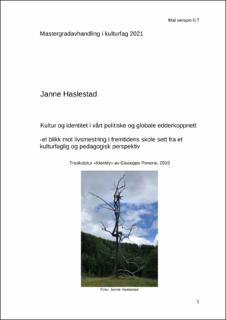Kultur og identitet i vårt politiske og globale edderkoppnett -et blikk mot livsmestring i fremtidens skole sett fra et kulturfaglig og pedagogisk perspektiv
Master thesis
Permanent lenke
https://hdl.handle.net/11250/2764826Utgivelsesdato
2021Metadata
Vis full innførselSamlinger
- Master i kulturstudier [129]
Sammendrag
Temaet i denne masteroppgaven er forholdet mellom samfunn og skole der temaet belyses for å undersøke om den politiske styringen av opplæringen har betydning for livsmestring i fremtidens skole. I dagens samfunn foregår utvikling hurtigere enn noensinne, og konsekvensene av globaliseringen påvirker kulturer og individer, inkludert barn og unge i opplæringen. Teoriperspektivet er pedagogisk, filosofisk, politisk, sosiologisk, psykologisk og historisk. Det brede flerfaglige teoriperspektivet legger grunnlaget for å undersøke forholdet mellom samfunn og skole. Den metodologiske tilnærmingen består av en kritisk diskursiv analyse og hermeneutisk tilnærming som fra to ulike perspektiv belyser forholdet mellom samfunn og skole. Datamaterialet som brukes er tre politisk styrte skolestyringsdokumenter. Både analysen og tolkningen tar utgangspunkt i felles nøkkeltemaer i empirien; kultur, globalisering, livsmestring og identitet. Gjennom et kritisk blikk på maktstrukturer, undersøker analysen konsekvensene som den politiske styringen får i forhold til livsmestring i skolen. Den hermeneutiske tilnærmingen kaster lys på elevenes livsmestring gjennom deler av et eksisterende tverrfaglig programfag i videregående skole som heter ‘kommunikasjon og kultur’. Funnene fra de to tilnærmingene ses i sammenheng med hverandre og drøftes i diskusjonsdelen. Studien viser at det er et gap mellom samfunn og skole som en følge av at skolen er politisk styrt og på grunn av konsekvenser globaliseringen har fått for både samfunn og individ. Samtidig viser funn et eksempel på at eksisterende fag legger til rette for livsmestring. Likevel genererer også funnene tanker som peker på at tiden er inne for å endre skolen siden barn og unges kulturelle identitet formes av samfunns- og skolekulturen. Tempoet i samfunnsutviklingen gjenspeiles ikke godt nok i skolehverdagen. Flere funn viser at mange er klar over denne stagnasjonen og varsler om endringer i opplæringen som må til for at barn og unge skal oppleve skolen som mer nyttig og aktuell i forhold til samfunnet vi lever i. Andre funn peker på nødvendigheten av at lærere og andre skoleaktører i større grad må få være med på å bestemme hva slags skole vi skal ha i fremtiden. Sist, men ikke minst, førte funnene til en visshet om at vi må være bevisste på hva slags samfunn vi skal ha for å kunne skape fremtidige skoler som i større grad gjenspeiler samfunnet enn i dag og som legger til rette for at barn og unge mestrer livet i fremtiden. The theme of this master’s thesis is the relationship between society and school, where the theme is highlighted to investigate whether the political management of education is important for life skills in future schools. Today development is taking place faster than ever, and the consequences of globalization are affecting cultures and individuals, including children and young people in education. The theoretical perspective is pedagogical, philosophical, political, sociological, psychological and historical. The broad multidisciplinary theoretical perspective lays the foundation for examining the relationship between society and school. The methodological approach consists of a critical discursive analysis and a hermeneutic approach which from two different perspectives illuminates the relationship between society and school. The data material used is three politically controlled school management documents. Both the analysis and the interpretation are based on common key themes in the empirical data; culture, globalization, life skills and identity. Through a critical look at power structures, the analysis examines the consequences the political management has to life skills in school. The hermeneutic approach sheds light on students’ life skills through parts of an existing interdisciplinary subject in upper secondary school called ‘communication and culture’. The findings from the two approaches are seen in connection with each other and are discussed in the discussion chapter. The study shows that there is a gap between society and school as a result of the school being politically controlled and due to the consequences globalization has had for both society and the individual. Findings also show an example of existing subjects facilitating life skills. Nevertheless, the findings also generate thoughts that indicate that time has come to change the school since children and young people’s cultural identity is shaped by society and school culture. The pace of societal development is not well enough reflected in everyday school life. Several findings show that many are aware of this stagnation and warn of changes in education that are necessary for young people to experience school as more useful and relevant to the society we live in. Other findings point out the need for teachers and other school actors must be more involved in deciding what kind of school we will have in the future. Findings also led to a certainty that we must be aware of what kind of society we should have to create future schools that to a greater extent reflect society than today and which facilitate that children and young people master life in the future.
